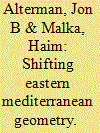| Srl | Item |
| 1 |
ID:
169598


|
|
|
|
|
| Summary/Abstract |
Mr. Chairman, Mr. Ranking Member, it is an honor for me to appear once again before this subcommittee, this time to discuss China's engagement in the Middle East and its implications for U.S. interests. It's important to remember that, 20 years ago, every government in the Middle East was either friendly to the United States government or seeking to become more so. While the United States was not exactly triumphant, it was unquestionably dominant. A great deal has happened in the last 20 years, and the United States is now struggling to determine what its position in the region should be, while Russia and China carefully advance their interests.
|
|
|
|
|
|
|
|
|
|
|
|
|
|
|
|
| 2 |
ID:
066135


|
|
|
| 3 |
ID:
073969


|
|
|
| 4 |
ID:
107588


|
|
|
| 5 |
ID:
116607


|
|
|
|
|
| Publication |
2012.
|
| Summary/Abstract |
The security architecture that the United States helped establish after the Cold War in the Eastern Mediterranean is crumbling. That architecture emphasized two triangular partnerships: U.S.-Turkey-Israel and U.S.-Egypt-Israel. Each had its origin in the Cold War and gained new emphasis afterwards as a cornerstone of U.S. efforts to promote Middle Eastern stability. Yet the evolution of internal politics in Turkey over the last decade, combined with more recent shifts in Egypt, have brought to the fore civilian politicians who are openly critical of such partnerships and who have sidelined the partnerships' military proponents. The demise of these two triangles has profound implications for Israeli security, as well as for the U.S. military and diplomatic role in the Eastern Mediterranean. The changing geometry of U.S. relationships in the Eastern Mediterranean is part of a set of broader trends that make it more difficult for the United States to shape outcomes and set agendas in the region. This change in particular is likely to force the United States to emphasize bilateral relationships and ad hoc direct action in the future, placing a greater demand on ongoing U.S. management than has been the case in the past.
|
|
|
|
|
|
|
|
|
|
|
|
|
|
|
|